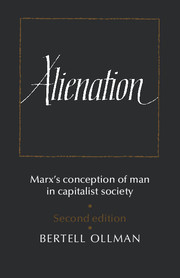Book contents
- Frontmatter
- Contents
- Preface to the second edition
- Note on translations
- Acknowledgements
- General introduction
- PART I PHILOSOPHICAL INTRODUCTION
- PART II MARX'S CONCEPTION OF HUMAN NATURE
- PART III THE THEORY OF ALIENATION
- 18 The theory of alienation
- 19 Man's relation to his productive activity
- 20 Man's relation to his product
- 21 Man's relation to his fellow men
- 22 Man's relation to his species
- 23 The capitalist's alienation
- 24 The division of labor and private property
- 25 The labor theory of value: labor-power
- 26 Value as alienated labor
- 27 The metamorphosis of value
- 28 The fetishism of commodities
- 29 Class as a value Relation
- 30 State as a value Relation
- 31 Religion as a value Relation
- 32 Marx's critique of bourgeois ideology
- PART IV CONCLUSION
- Appendix I In defense of the philosophy of internal relations
- Appendix II Response to my critics: more on internal relations
- Notes to the text
- Bibliography of works cited
- Index of names and ideas
- Cambridge Studies in the History and Theory of Politics
27 - The metamorphosis of value
Published online by Cambridge University Press: 05 June 2012
- Frontmatter
- Contents
- Preface to the second edition
- Note on translations
- Acknowledgements
- General introduction
- PART I PHILOSOPHICAL INTRODUCTION
- PART II MARX'S CONCEPTION OF HUMAN NATURE
- PART III THE THEORY OF ALIENATION
- 18 The theory of alienation
- 19 Man's relation to his productive activity
- 20 Man's relation to his product
- 21 Man's relation to his fellow men
- 22 Man's relation to his species
- 23 The capitalist's alienation
- 24 The division of labor and private property
- 25 The labor theory of value: labor-power
- 26 Value as alienated labor
- 27 The metamorphosis of value
- 28 The fetishism of commodities
- 29 Class as a value Relation
- 30 State as a value Relation
- 31 Religion as a value Relation
- 32 Marx's critique of bourgeois ideology
- PART IV CONCLUSION
- Appendix I In defense of the philosophy of internal relations
- Appendix II Response to my critics: more on internal relations
- Notes to the text
- Bibliography of works cited
- Index of names and ideas
- Cambridge Studies in the History and Theory of Politics
Summary
Having presented labor-power as potential for alienated productive activity and the equation of labor and value, I am now in a position to explain the metamorphosis of value and the fetishism of commodities. Labor, as we saw, is embodied in all its products. Hence, as its equivalent in capitalism, the same applies to value. The worker produces an article which contains his labor in the form of use and exchange-value. Then, according to Marx:
The actual process of production, as a unity of the direct production process and the circulation process gives rise to new formations, in which the vein of internal connections is increasingly lost, the production relations are rendered independent of one another, and the component values become ossified into forms independent of one another (my emphasis).
The guises assumed by value in its merry-go-round journey through the economy include capital, commodity, landed property, profit, interest, rent, wages and money. Marx would maintain that these are ‘more concrete economic determinations from which value is abstracted and which from another point of view, can therefore also be regarded as a further development of it’. All derive from the worker's alienated productive activity, and each expresses the full set of conditions in which it exists. As components of value they are facets of the same organic whole, capitalist society. On this view, too much of orthodox economics has been devoted to trying to explain how such apparently distinct entities are related.
- Type
- Chapter
- Information
- AlienationMarx's Conception of Man in a Capitalist Society, pp. 187 - 194Publisher: Cambridge University PressPrint publication year: 1977

